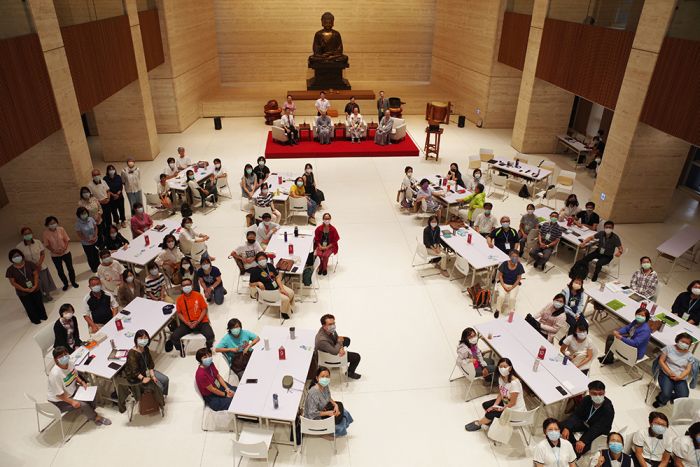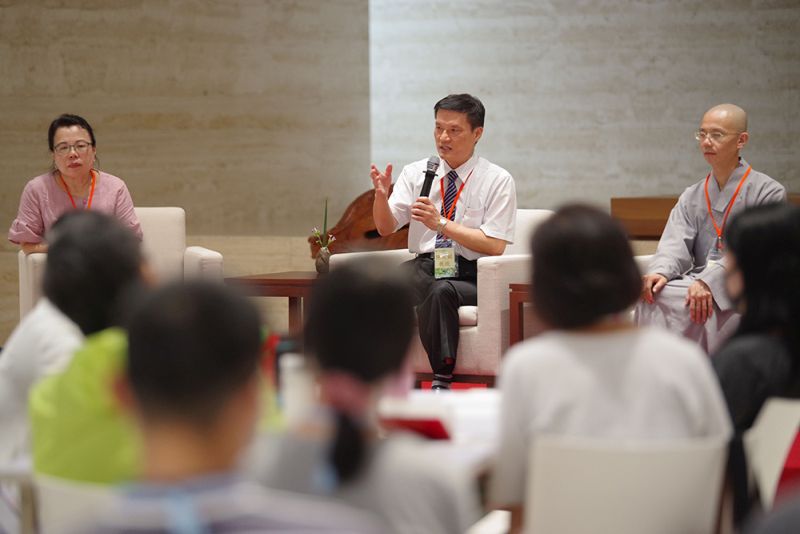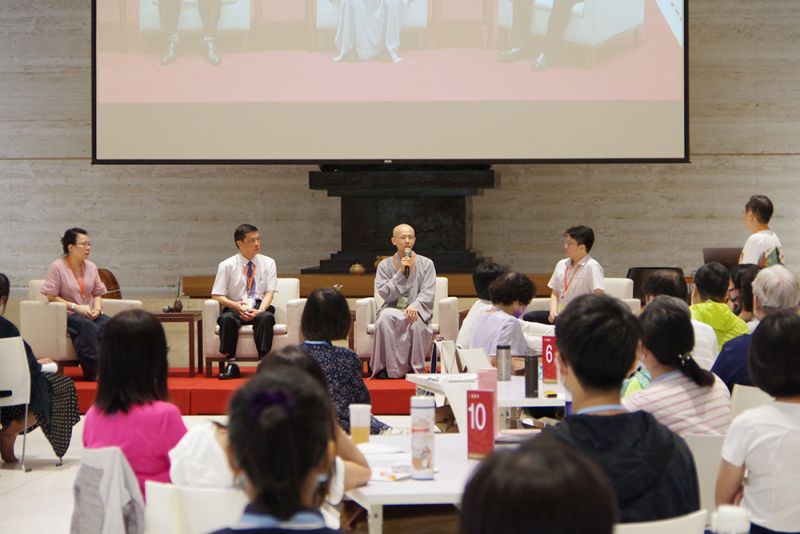DDM Global News
Lifelong Learning through the Bodhisattva Path Workshop:
Reflecting on the Pandemic and Facing the World with Calmness
Master Sheng Yen, the founder of Dharma Drum Mountain, had devoted himself to adapting the Dharma to current issues so that we could reflect on current issues from the perspectives of the Dharma and conversely, have the current world situations remind ourselves of the Dharma. In the face of the Covid-19 pandemic, how should we utilize Buddhist education and thought to face the world calmly?

On July 25 2020, Dharma Drum Institute of Liberal Arts held a workshop on “Lifelong Learning through the Bodhisattva Path” at Pao Yung temple in Taichung. This workshop was organized by Professor Chen Ding-Ming, director of the Graduate School of Humanities and Social Sciences, and graduate school teachers from the Department of Buddhist Studies. 72 students from all over Taiwan attended this workshop. Dialogues on reflections and concerns during this pandemic from the perspective of Four Kinds of Environmentalism started a journey of lifelong learning through the Bodhisattva Path.
A dialogue on “reflection and caring deeds during the pandemic” was hosted by Yang Bei, Head of the Master of Life Education program. Director Chen Ming Ding, Ye Ling-Ling, head of the Master of Social Enterprise and Innovation program, Huang Xin-Xun, head of the Mind-life and Environment Research Center, as well as Venerable Chang Shun, director-secretary of Dharma Drum Social Welfare and Charity Foundation, were the four panelists who participated in this dialogue. The global impact of this pandemic from the perspectives of environment, history, medical care, global economics, and religion were discussed.

According to Chen Ding-Ming: “This pandemic has caused the world to experience radical changes in humanity, society, environment, medical care, hygiene, and economy.” In this rapidly changing environment, faith in religion, guidance from philosophy, scientific breakthroughs, promotion of culture and arts, as well as education contribute to peace of mind. From an economic perspective, this pandemic leads to the realization that economic entities need to develop towards “benefitting others and creating common worth”, that is, transforming values into a positive economy of mutual benefit, sharing, and common prosperity. Entrepreneurs have the responsibility to redirect their enterprises to more “humane” entities.
In regards to medical treatment and health, Ye Ling-Ling pointed out that in addition to taking care of our physical health and strengthening immunity, we should take care of our mental health as well. “Use Master Sheng Yen's Four Steps in Dealing with Problems to face the pandemic and rise above ourselves during this pandemic.” Ye encouraged the audience to use correct knowledge and understanding to face and deal with this pandemic in the best way possible, just as how we would deal with matters in our daily lives.
Huang Xin-Xun said that from an environmental and historical perspective, globalization and our continuous intrusion into the natural environment allow the pandemic to spread rapidly around the world. “Christopher Columbus landed in America in 1492 and this led to the interaction of life forms between the old and the new worlds; from the viewpoint of biological interaction, the virus does not intend to kill its host but seeks to co-exist.” We are not the victim of this novel coronavirus. We can clearly see our course of action if we reflect on the relationship between man and nature.

Venerable Chang Shun described the programs set up by DDM to help devotees gain peace of mind during this pandemic. These programs include a website for those seeking peace-of-mind and calmness, online dharma assemblies and courses, “The Great Compassion Mantra LINE” for mobile phone users, extended social care, regional services for peace of mind, as well as workshops for making face masks.
Text: Chen ,Yi-Huei (陳逸慧)
Photos: Huang, Ren-Da (黃仁達); Liou,Siou-Wun (劉秀雯)
Translation: Hsiao, Chen-An (蕭宸安)
Editing: Shujen Yeh (葉姝蓁 ); Leefah Thong

On July 25 2020, Dharma Drum Institute of Liberal Arts held a workshop on “Lifelong Learning through the Bodhisattva Path” at Pao Yung temple in Taichung. This workshop was organized by Professor Chen Ding-Ming, director of the Graduate School of Humanities and Social Sciences, and graduate school teachers from the Department of Buddhist Studies. 72 students from all over Taiwan attended this workshop. Dialogues on reflections and concerns during this pandemic from the perspective of Four Kinds of Environmentalism started a journey of lifelong learning through the Bodhisattva Path.
A dialogue on “reflection and caring deeds during the pandemic” was hosted by Yang Bei, Head of the Master of Life Education program. Director Chen Ming Ding, Ye Ling-Ling, head of the Master of Social Enterprise and Innovation program, Huang Xin-Xun, head of the Mind-life and Environment Research Center, as well as Venerable Chang Shun, director-secretary of Dharma Drum Social Welfare and Charity Foundation, were the four panelists who participated in this dialogue. The global impact of this pandemic from the perspectives of environment, history, medical care, global economics, and religion were discussed.

According to Chen Ding-Ming: “This pandemic has caused the world to experience radical changes in humanity, society, environment, medical care, hygiene, and economy.” In this rapidly changing environment, faith in religion, guidance from philosophy, scientific breakthroughs, promotion of culture and arts, as well as education contribute to peace of mind. From an economic perspective, this pandemic leads to the realization that economic entities need to develop towards “benefitting others and creating common worth”, that is, transforming values into a positive economy of mutual benefit, sharing, and common prosperity. Entrepreneurs have the responsibility to redirect their enterprises to more “humane” entities.
In regards to medical treatment and health, Ye Ling-Ling pointed out that in addition to taking care of our physical health and strengthening immunity, we should take care of our mental health as well. “Use Master Sheng Yen's Four Steps in Dealing with Problems to face the pandemic and rise above ourselves during this pandemic.” Ye encouraged the audience to use correct knowledge and understanding to face and deal with this pandemic in the best way possible, just as how we would deal with matters in our daily lives.
Huang Xin-Xun said that from an environmental and historical perspective, globalization and our continuous intrusion into the natural environment allow the pandemic to spread rapidly around the world. “Christopher Columbus landed in America in 1492 and this led to the interaction of life forms between the old and the new worlds; from the viewpoint of biological interaction, the virus does not intend to kill its host but seeks to co-exist.” We are not the victim of this novel coronavirus. We can clearly see our course of action if we reflect on the relationship between man and nature.

Venerable Chang Shun described the programs set up by DDM to help devotees gain peace of mind during this pandemic. These programs include a website for those seeking peace-of-mind and calmness, online dharma assemblies and courses, “The Great Compassion Mantra LINE” for mobile phone users, extended social care, regional services for peace of mind, as well as workshops for making face masks.
Text: Chen ,Yi-Huei (陳逸慧)
Photos: Huang, Ren-Da (黃仁達); Liou,Siou-Wun (劉秀雯)
Translation: Hsiao, Chen-An (蕭宸安)
Editing: Shujen Yeh (葉姝蓁 ); Leefah Thong
